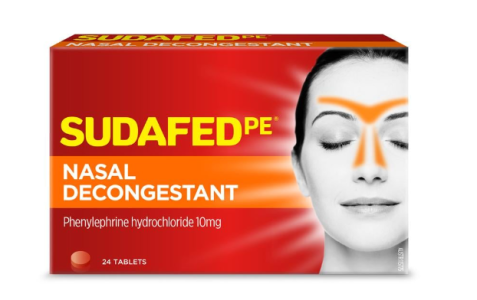TGA considers options after experts’ doubts on popular decongestant surface
Many of us at the SDC will already be aware of the unique combination of misery and discomfort that goes hand-in-hand with sinus and ear infections. The pressure and shooting pains, often accompanied by blocked ears and stuffiness, can be very uncomfortable indeed.
It's one of those inevitable inconveniences, yet we still do all we can to combat these ailments head-on. Doing everything from keeping hydrated and taking self-care breaks to over-the-counter medicines and decongestants.
So you can imagine our surprise when we heard of the findings of a recent review conducted by the US government, which looked into the effectiveness of a particular ingredient commonly found in decongestant medications—one that is stocked on store shelves around the world: phenylephrine.
Findings from a panel of experts from the US Government’s Food and Drug Administration (FDA), which voted unanimously against the effectiveness of the ingredient, has created a wave of concern across the globe.
Dr Mark Dykewicz, an allergy specialist at the Saint Louis University School of Medicine, said: ‘Modern studies, when well conducted, are not showing any improvement in congestion with phenylephrine.’
The Therapeutic Goods Administration (TGA) in Australia has responded to the news by saying it is monitoring the situation and will 'take action as required'.
‘The TGA is not aware that the FDA has identified safety concerns or made a decision that phenylephrine is ineffective,’ a spokesperson said.
'The TGA Delegate considers all current information to ensure the benefits of the medicine outweigh the risks before approving a medicine,' they explained.
'The TGA is constantly monitoring actions taken by, and communicating with, comparable overseas regulators and will take action as required.'
The spokesperson added: ‘Further, as new scientific information becomes available, ingredients may undergo further evaluation to consider the risk-benefit profile.’
Phenylephrine is found in popular versions of Sudafed, Dayquil and other medications stocked on US and Australian store shelves. It became the main drug in over-the-counter decongestants when medicines with an older ingredient—pseudoephedrine—were moved behind pharmacy counters.
In the US, a 2006 law forced the move because pseudoephedrine can be illegally processed into methamphetamine. However, with modern studies demonstrating that phenylephrine does not improve congestion, experts in the US have questioned the drug’s effectiveness and ultimately voted against it.
'I feel this drug in this oral dose should have been removed from the market a long time ago,' said Jennifer Schwartzott, the patient representative on the US FDA panel.
‘Patients require and deserve medications that treat their symptoms safely and effectively, and I don’t believe that this medication does that,’ she added.
While it might make sense to test phenylephrine at higher doses, the panel, composed of 16 members, does not recommend it because the drug can elevate blood pressure to dangerous levels.
‘I think there’s a safety issue there,’ Dr Paul Pisaric of Archwell Health in Oklahoma claimed.
‘This is a done deal as far as I’m concerned. It doesn’t work.’
The FDA assembled its outside advisers to take another look at phenylephrine, but questions remain about what this means for Australia and other countries using the drug.
This week’s two-day meeting was prompted by University of Florida researchers who petitioned the FDA to remove most phenylephrine products based on earlier studies showing they failed to outperform placebo pills in patients with cold and allergy congestion.
If the FDA follows through on the panel’s recommendations, Johnson & Johnson, Bayer and other drugmakers could be required to pull their oral medications containing phenylephrine from store shelves in the US.
However, this may not apply to Australian shelves, and instead, a similar decision will be made here by the TGA.
What would this mean for Australians? If phenylephrine was removed from Australian shelves, that could leave consumers here to switch to alternative products or phenylephrine-based nasal sprays and drops.
The FDA said that would likely require it to work with drugstores, pharmacists and other health providers to educate consumers about the remaining options for treating congestion.
In a recent statement, the US FDA also clarified that the panel’s findings did not indicate any safety concerns on phenylephrine.
‘The committee discussed new data on the effectiveness of oral phenylephrine and concluded that the current scientific data do not support that the recommended dosage of orally administered phenylephrine is effective as a nasal decongestant,’ they said.
‘However, neither FDA nor the committee raised concerns about safety issues with use of oral phenylephrine at the recommended dose.’

Members, it’s important to stay abreast of this developing story and other news related to medications and the health advice that Australian organisations, like the TGA, provide.
If phenylephrine was removed from our shelves, it would be a pretty major development and one that could have a major effect on how we treat congestion in the future.
What do you think of this story, members? Let us know in the comments below!
It's one of those inevitable inconveniences, yet we still do all we can to combat these ailments head-on. Doing everything from keeping hydrated and taking self-care breaks to over-the-counter medicines and decongestants.
So you can imagine our surprise when we heard of the findings of a recent review conducted by the US government, which looked into the effectiveness of a particular ingredient commonly found in decongestant medications—one that is stocked on store shelves around the world: phenylephrine.
Findings from a panel of experts from the US Government’s Food and Drug Administration (FDA), which voted unanimously against the effectiveness of the ingredient, has created a wave of concern across the globe.
Dr Mark Dykewicz, an allergy specialist at the Saint Louis University School of Medicine, said: ‘Modern studies, when well conducted, are not showing any improvement in congestion with phenylephrine.’
The Therapeutic Goods Administration (TGA) in Australia has responded to the news by saying it is monitoring the situation and will 'take action as required'.
‘The TGA is not aware that the FDA has identified safety concerns or made a decision that phenylephrine is ineffective,’ a spokesperson said.
'The TGA Delegate considers all current information to ensure the benefits of the medicine outweigh the risks before approving a medicine,' they explained.
'The TGA is constantly monitoring actions taken by, and communicating with, comparable overseas regulators and will take action as required.'
The spokesperson added: ‘Further, as new scientific information becomes available, ingredients may undergo further evaluation to consider the risk-benefit profile.’
Phenylephrine is found in popular versions of Sudafed, Dayquil and other medications stocked on US and Australian store shelves. It became the main drug in over-the-counter decongestants when medicines with an older ingredient—pseudoephedrine—were moved behind pharmacy counters.
In the US, a 2006 law forced the move because pseudoephedrine can be illegally processed into methamphetamine. However, with modern studies demonstrating that phenylephrine does not improve congestion, experts in the US have questioned the drug’s effectiveness and ultimately voted against it.
'I feel this drug in this oral dose should have been removed from the market a long time ago,' said Jennifer Schwartzott, the patient representative on the US FDA panel.
‘Patients require and deserve medications that treat their symptoms safely and effectively, and I don’t believe that this medication does that,’ she added.
While it might make sense to test phenylephrine at higher doses, the panel, composed of 16 members, does not recommend it because the drug can elevate blood pressure to dangerous levels.
‘I think there’s a safety issue there,’ Dr Paul Pisaric of Archwell Health in Oklahoma claimed.
‘This is a done deal as far as I’m concerned. It doesn’t work.’
The FDA assembled its outside advisers to take another look at phenylephrine, but questions remain about what this means for Australia and other countries using the drug.
This week’s two-day meeting was prompted by University of Florida researchers who petitioned the FDA to remove most phenylephrine products based on earlier studies showing they failed to outperform placebo pills in patients with cold and allergy congestion.
If the FDA follows through on the panel’s recommendations, Johnson & Johnson, Bayer and other drugmakers could be required to pull their oral medications containing phenylephrine from store shelves in the US.
However, this may not apply to Australian shelves, and instead, a similar decision will be made here by the TGA.
What would this mean for Australians? If phenylephrine was removed from Australian shelves, that could leave consumers here to switch to alternative products or phenylephrine-based nasal sprays and drops.
The FDA said that would likely require it to work with drugstores, pharmacists and other health providers to educate consumers about the remaining options for treating congestion.
In a recent statement, the US FDA also clarified that the panel’s findings did not indicate any safety concerns on phenylephrine.
‘The committee discussed new data on the effectiveness of oral phenylephrine and concluded that the current scientific data do not support that the recommended dosage of orally administered phenylephrine is effective as a nasal decongestant,’ they said.
‘However, neither FDA nor the committee raised concerns about safety issues with use of oral phenylephrine at the recommended dose.’
Key Takeaways
- The Therapeutic Goods Administration (TGA) in Australia is ‘monitoring’ developments on phenylephrine, a popular decongestant, after US experts found it does not actually relieve congestion, especially when taken orally.
- A panel of experts from the US Food and Drug Administration (FDA) unanimously voted against the effectiveness of the key drug found in popular cold and flu medicines like Sudafed and Dayquil.
- The TGA stated they will 'take action as required'.
- If the FDA follows through on the panel’s recommendations, drugmakers like Johnson & Johnson and Bayer could be required to pull their oral medications containing phenylephrine from store shelves in the US.
Members, it’s important to stay abreast of this developing story and other news related to medications and the health advice that Australian organisations, like the TGA, provide.
If phenylephrine was removed from our shelves, it would be a pretty major development and one that could have a major effect on how we treat congestion in the future.
What do you think of this story, members? Let us know in the comments below!








